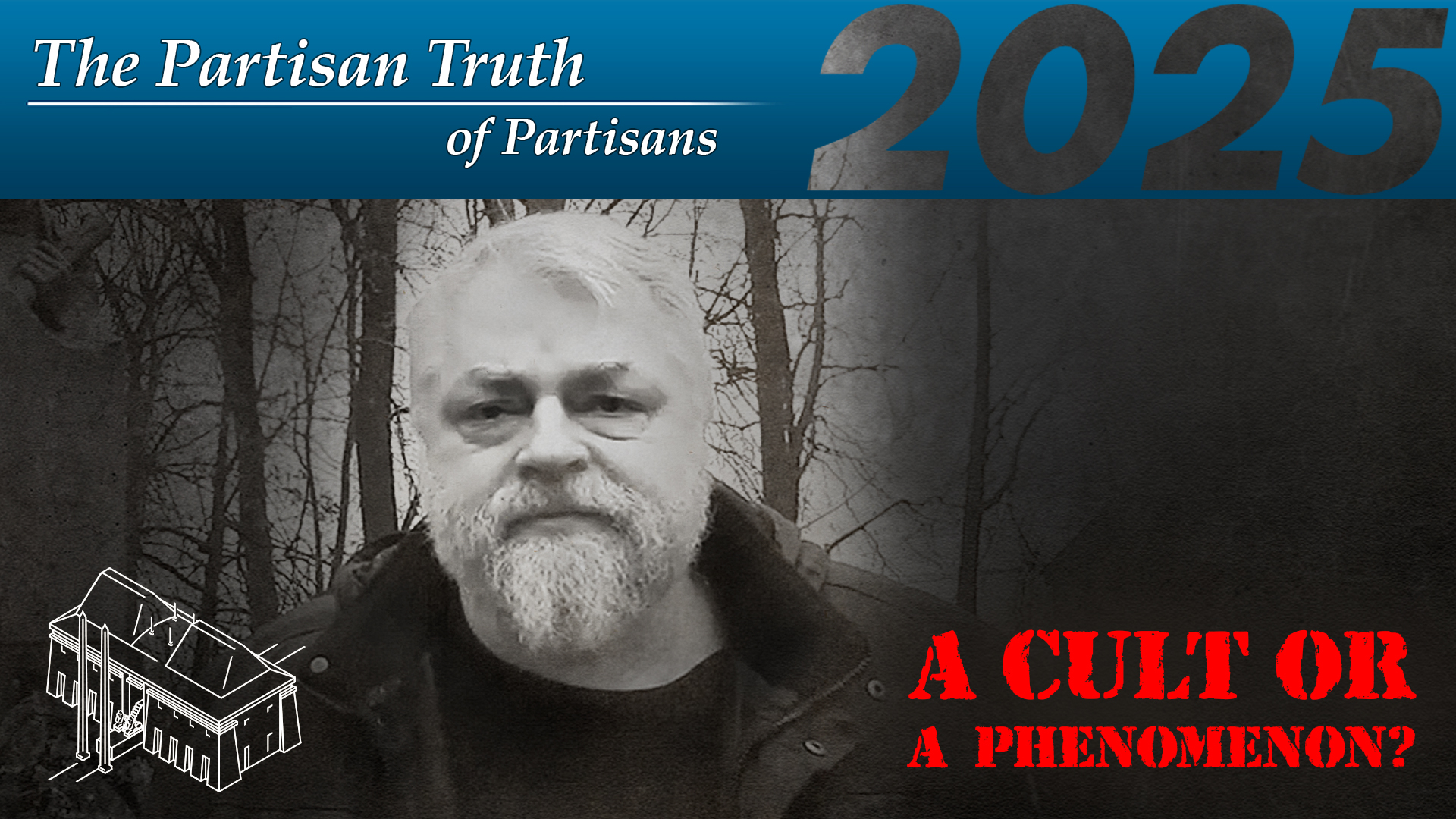
Here, we will briefly present facts that were overlooked by journalists who widely covered the arrest of the writer and his wife, Slatana Meniailova, in 2018 in the town of Suvorov in the Tula region, Russia.
We will explore who Aleksei Meniailov is, why “Partisan Truth of Partisans”, what actually served as the reason for their arrest, and what “PTP” is doing in 2025.
- Brief Biography of Aleksei Meniailov
- What Does Aleksei Meniailov Do?
- Why “Partisan Truth of Partisans”? Where Did the “Partisans” Come From and How Did They Become “Paleontologists”?
- The Museum of Heroes and Provincial Officials
- Trial by Media
- The trial of “Partizanskaya Pravda Partizan”
- Slatana Meniailova in prison for humiliating herself?
- Is Meniailov an extremist, madman, or a scholar?
- How Did Aleksei and Slatana Meniailov Get Out of Prison?
- Where Is the Former “Partisan Truth of Partisans” Now?
- 2020
- 2021-2023
- 2023-2024
- 2024
Brief Biography of Aleksei Meniailov
Aleksei Aleksandrovich Meniailov was born on February 11, 1957, into a family of scientists. His father was a prominent Soviet volcanologist and a decorated World War II veteran, while his mother was a distinguished inventor in the USSR. Growing up in an academic environment, Meniailov developed an inquisitive nature and read extensively, including works about the Great Patriotic War (World War II). His father, once a week, would take him on hikes in the forest, where, around the campfire, he would tell stories of life on the front lines and significant military events he had witnessed.
Meniailov attended a specialized school in Moscow with a focus on English. After school, he entered the Moscow Institute of Petrochemical and Gas Industry named after academician Ivan Gubkin, where he specialized in the technology of basic organic and petrochemical synthesis and became a qualified engineer-technologist. In 1978, he completed military training and received the rank of lieutenant-engineer. He worked as a research associate at the Institute of Russian History of the Russian Academy of Sciences, focusing on the history of World War II.
In 1993, Meniailov began his writing career. From 1997 to 1998, he was a member of the Union of Russian Writers, and since 2015, he has been a member of the Russian Philosophical Society. The “Kraft+” publishing house has published 12 of his books on psychoanalysis, history, and literary studies.
During his research on World War II, Meniailov became interested in studying the formation of Joseph Stalin’s personality, the future leader of the USSR. Currently, Meniailov is the only researcher in the world who has conducted a multi-year expedition to all of Joseph Stalin’s political exile locations.
What Does Aleksei Meniailov Do?
Meniailov’s books are available online. For easier and more convenient study of the writer’s works, new research findings are presented in video formats, often featuring clips from masterpieces of world cinema and literature: both artistic, scientific, and memoir-based.
His main line of research focuses on the biography of Joseph Stalin. As mentioned earlier, Meniailov spent many years in the places where Stalin was exiled, and together with his wife, Slatana Alekseevna Meniailova, he continues to visit the places where the future leader of the USSR is believed to have formed his personality.
Meniailov’s research delves into a wide range of topics, as Stalin himself was known to have a broad worldview. These topics include:
- Military affairs, particularly partisan movements during World War II;
- Drama – Shakespeare’s and Molière’s plays;
- Paleontology – evolution theories;
- Antiquity – the history of ancient Rome, Greek mythology;
- Other areas related to Stalin’s experiences or those he could have encountered.
Meniailov is not shy about giving his research results extravagant, attention-grabbing titles, and sometimes uses strong language where necessary in his materials. As the author of the immortal work “The Good Soldier Švejk”, Jaroslav Hašek once wrote:
“It was once rightly said that a well-bred person can read anything. Only spiritually shameless people, who are adept at vulgarity and adhering to false morality, will not focus on the content but instead angrily attack certain words.”
Why “Partisan Truth of Partisans”? Where Did the “Partisans” Come From and How Did They Become “Paleontologists”?
Academician Vladimir Vernadsky, in his memoirs about the beginning of the war, wrote:
“Why do the newspapers only write about the partisans, but where is our army?”
Aleksei Meniailov has been interested in the partisan movement of the Great Patriotic War since his youth. The more he studied the topic, the more he came to understand that there was much to learn from partisans, including their luck (being in the right place at the right time).
At the early stages of his research, Meniailov focused on the partisan units of the Soviet Union that operated during World War II, such as those led by Sidor Kovpak, Peter Ignatov, Michael Naumov, Gregory Linkov (Prominent leaders of the Soviet partisans during WW2), and others.
Joseph Stalin once said:
“One partisan behind enemy lines is worth hundreds of soldiers on the front.”
The complexity and uniqueness of the partisan situation allowed researchers to identify successful commanders and fighters. Memoir analysis revealed common features in their worldviews. Thus, a significant part of Meniailov’s research was based on partisan themes, giving his works a distinctly partisan tone.
Interestingly, the movement’s name has roots in the partisan unit of Dmitry Emlyutin, where the commanders and fighters independently published a newspaper titled “Partisan Truth.” This is how Meniailov’s online page “Partisan Truth of Partisans” came into existence, where he began publishing his research and searching for like-minded individuals.
Later, his research shifted from military science to paleontology, focusing on the survival and effectiveness of partisan units in war, and the evolution of species throughout history.
As is known from open sources, Stalin studied Darwin’s and Lamarck’s works in underground circles during his time in seminary. This episode was recalled by law enforcement when, for unknown reasons, they banned the transfer of books (!) and textbooks on paleontology to Meniailov in the pre-trial detention center.
In addition to paleontology, Meniailov also became interested in Shakespeare’s works during his imprisonment. As is also well known from open sources, Stalin was a great admirer of Shakespeare and could quote large passages from his plays in the original language.
After his release, Aleksei Meniailov, as a researcher, focused primarily on issues of paleontology and Shakespeare studies. As these topics began to take precedence in his videos and seminars, pushing military topics to the background, the partisans transformed into paleontologists, and the page on the internet was renamed to “Paleontological Truth of Paleontologists and Shakespeare“.
The Museum of Heroes and Provincial Officials
An important stage in the activities of Aleksei Meniailov and the “Partisan Truth of Partisans” was the construction of the “Museum of Heroes as Teachers of Luck”, which continues the study of the history of the Great Patriotic War.
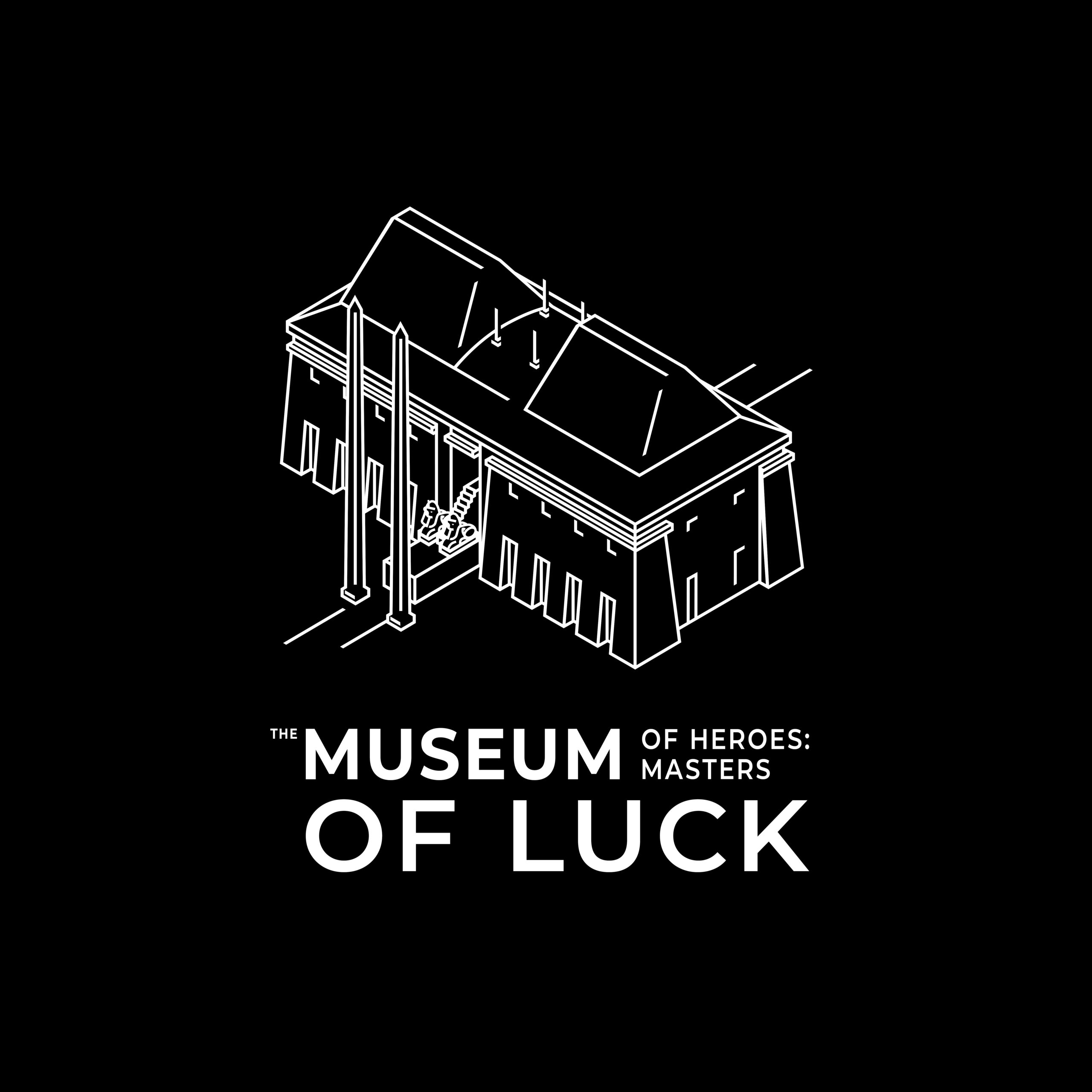
The location chosen for the creation of the Museum was the town of Suvorov in the Tula region, specifically the building of an abandoned, half-burnt kindergarten. Suvorov was selected due to its location: a quiet, green town, but not too far from major centers. The choice of building was also influenced by the financial capabilities of the writer.
Aleksei Meniailov envisioned the Museum as a tribute to the history of figures like Zoya Kosmodemyanskaya, Arkady Gaidar, Nikolai Gastello, Liza Chaikina, Alexander Chekalin, Alexander Matrosov, Lyubov Shevtsova, and Sergey Tyulinin (Heroes of Soviet Union who were brutally executed by invading armies of Nazi Germany). These Heroes were particularly highlighted by Joseph Stalin during the Great Patriotic War for their acts of valor.
The project began with the repair of the burned roof, with volunteers serving as builders and workers: readers and viewers of Aleksei Meniailov, as well as concerned individuals from different parts of the country and abroad.
Initially, the local administration was supportive of the writer’s patriotic endeavors, but as the concept of the Museum progressed, the behavior of the Suvorov officials became increasingly strange.
The bureaucratic apparatus often did not understand what exactly needed to be documented for the building. The officials were unable to specify what had to be corrected or done in order to avoid any complaints from the administration regarding the Museum project. Aleksei Meniailov found this state of uncertainty unsatisfactory, and time and again, he, together with lawyers and architects, tried to get a clear response.
Ultimately, after Meniailov addressed all the officials’ objections, the authorities simply prohibited any further work on the Museum grounds, claiming that the ongoing construction posed a “threat to the lives of an unspecified group of individuals.” Moreover, they demanded that the building be returned to its “original state,” i.e., with the burned roof still in place.
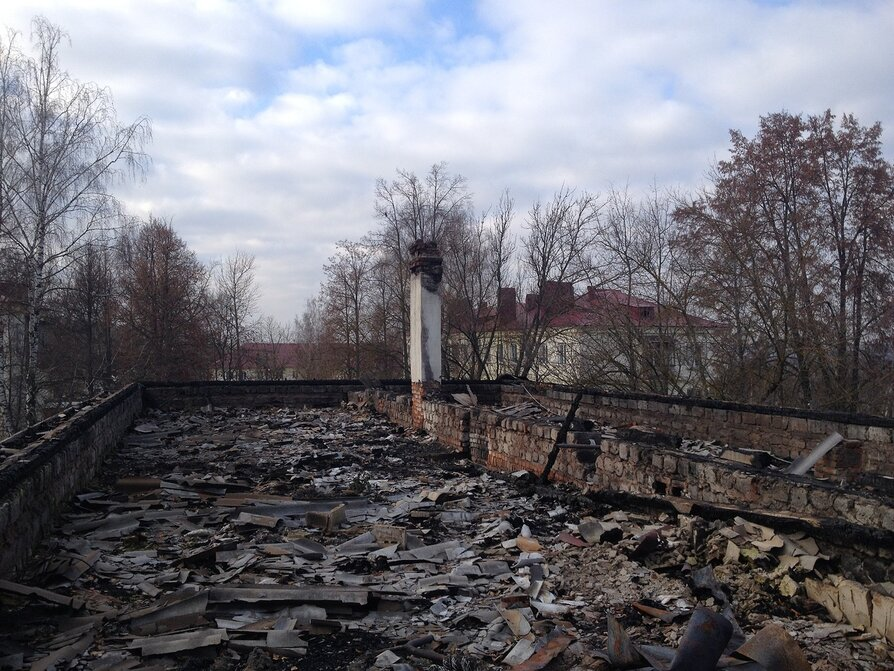


By the time the bans were imposed, the installation of the “Kremlin” checker had already begun.
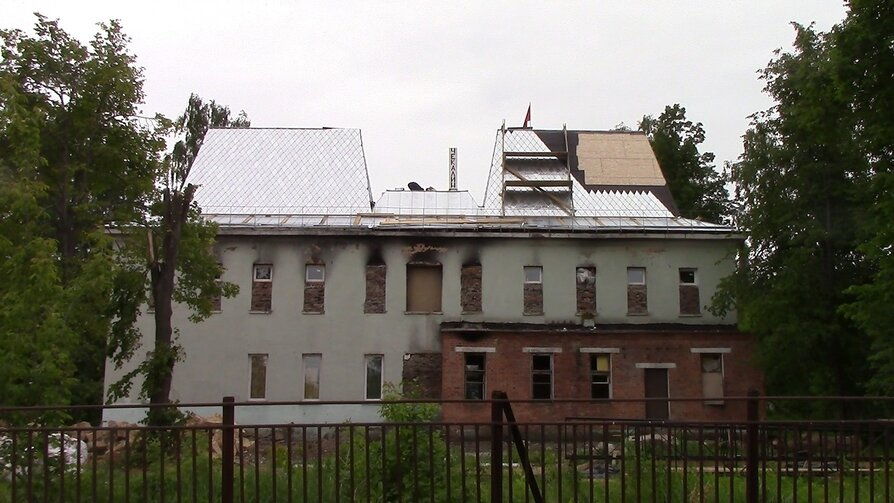
Some time after a brief lull, heavily armed special forces burst into the apartment where Aleksei and Slatana Meniailov lived. At the same time, searches were also being carried out in the apartments of the volunteers, and the volunteers themselves were lying on the floor under the barrels of OMON (special police unit) assault rifles.
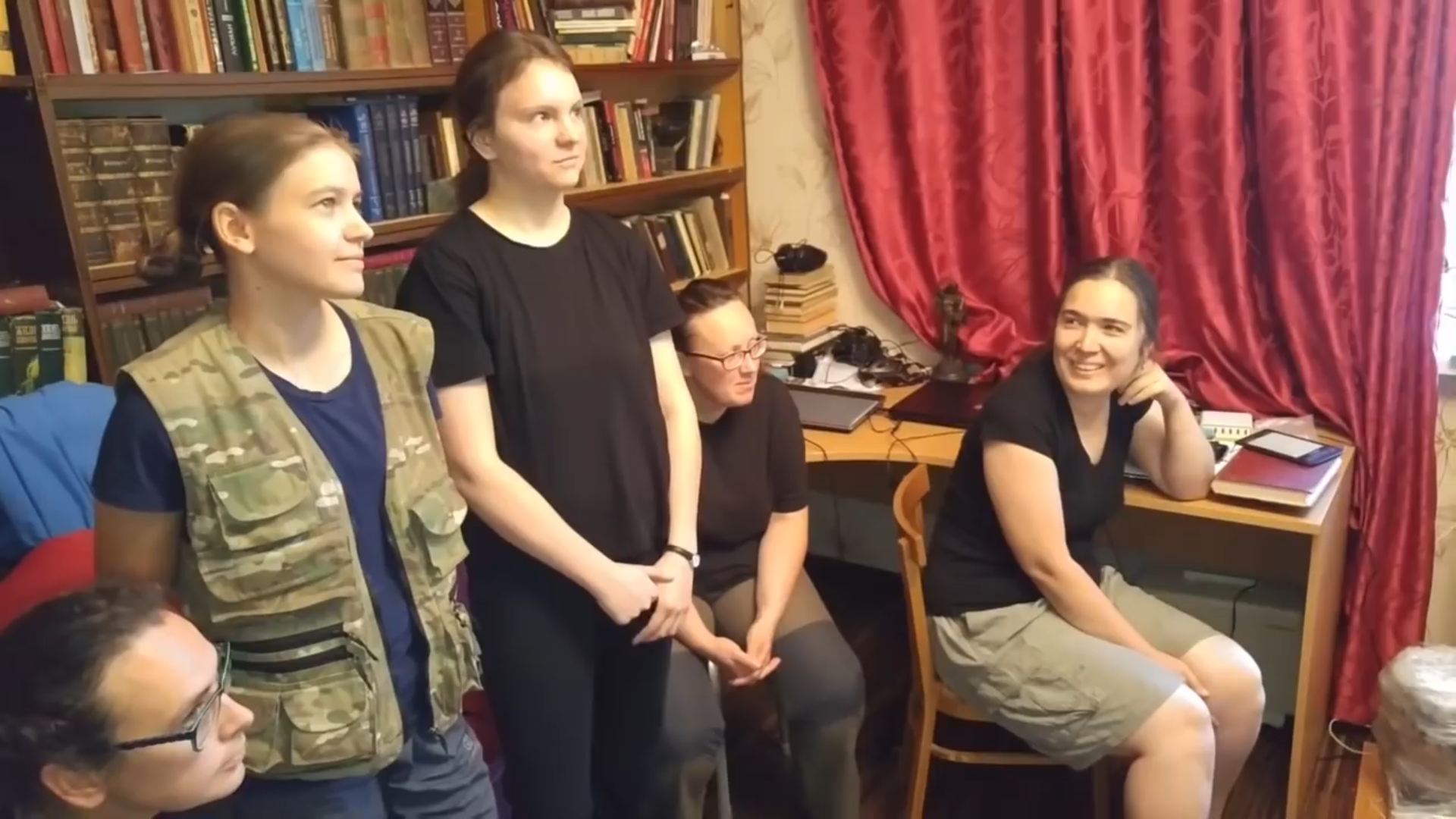
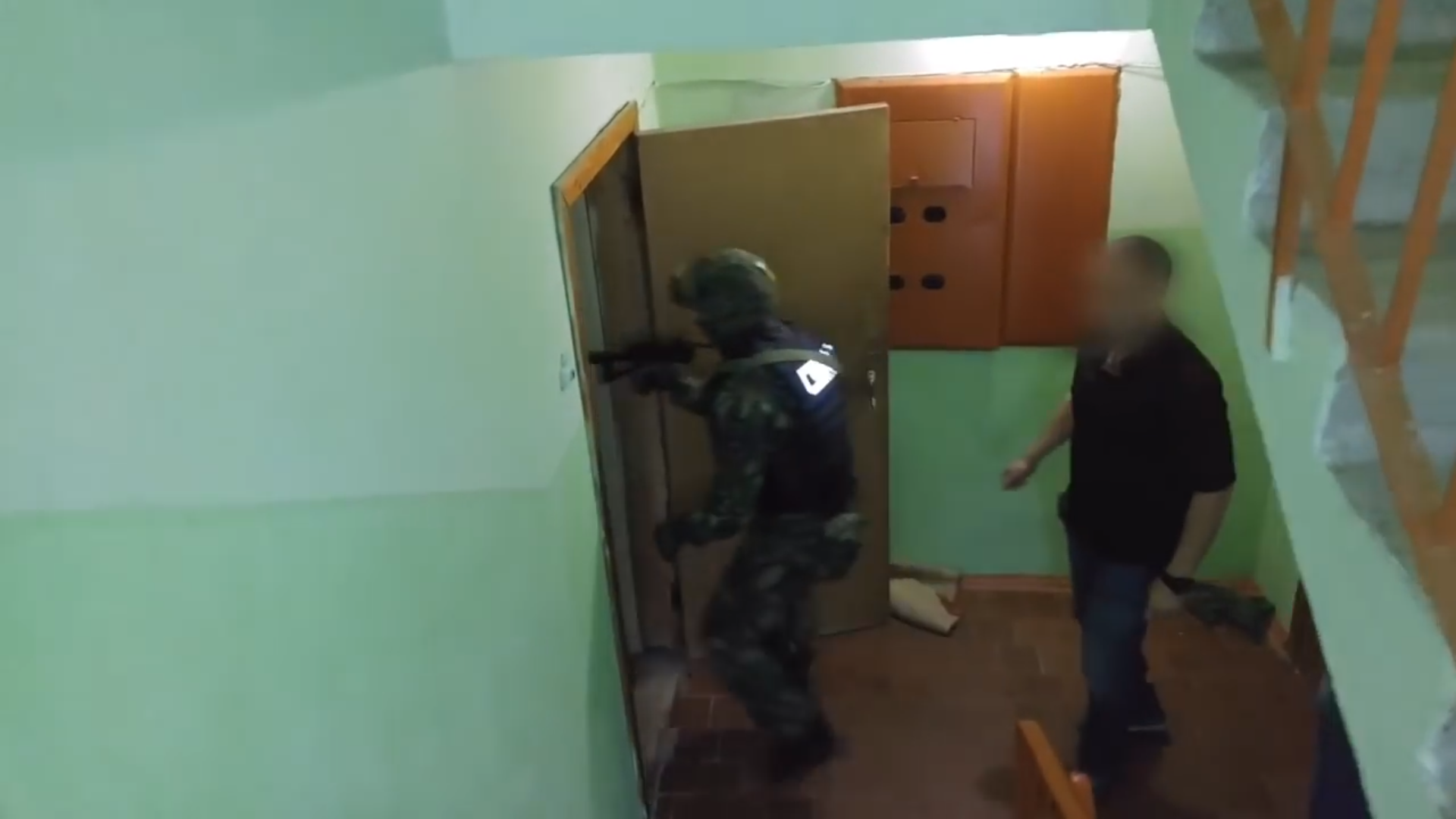
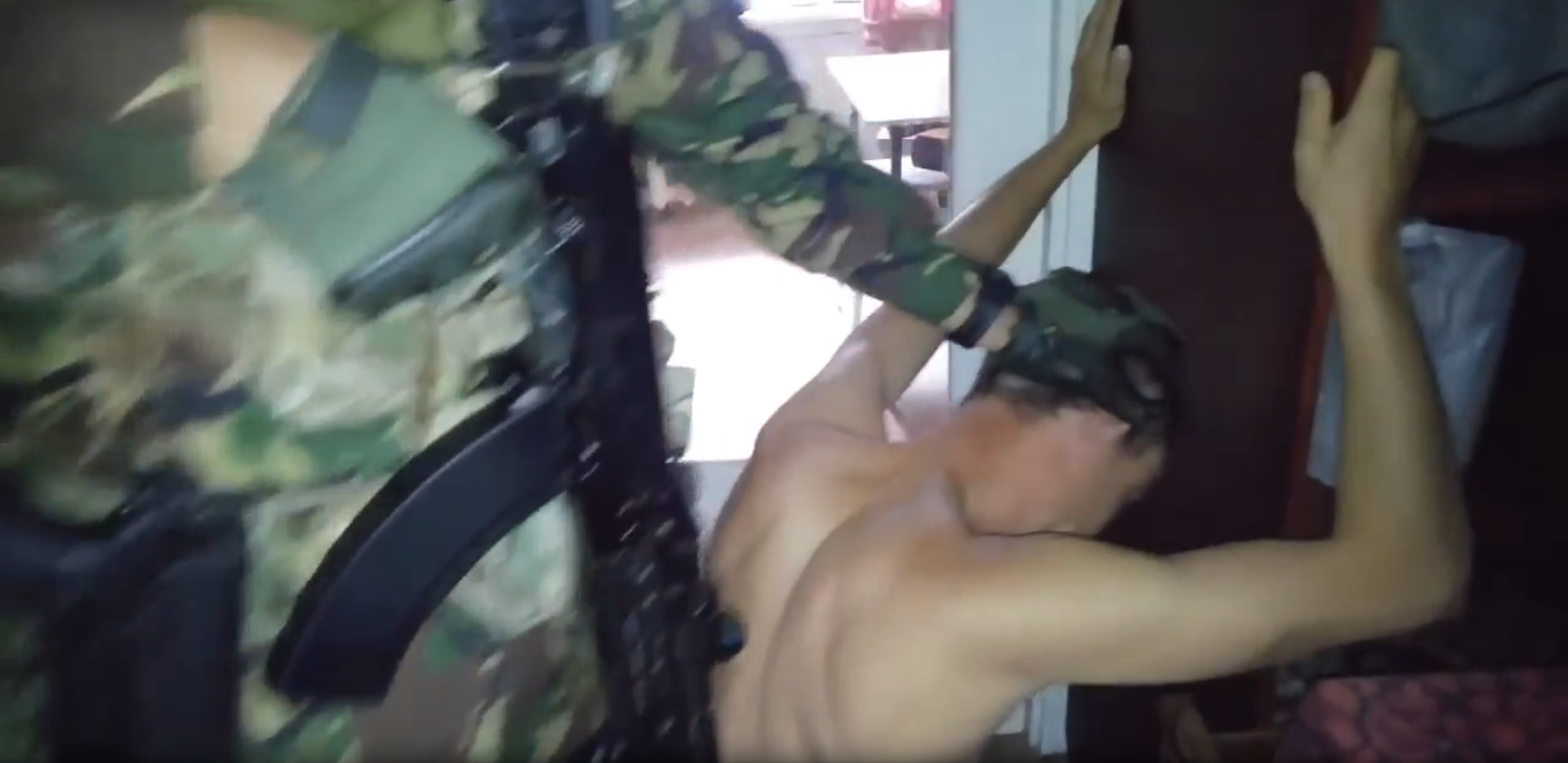
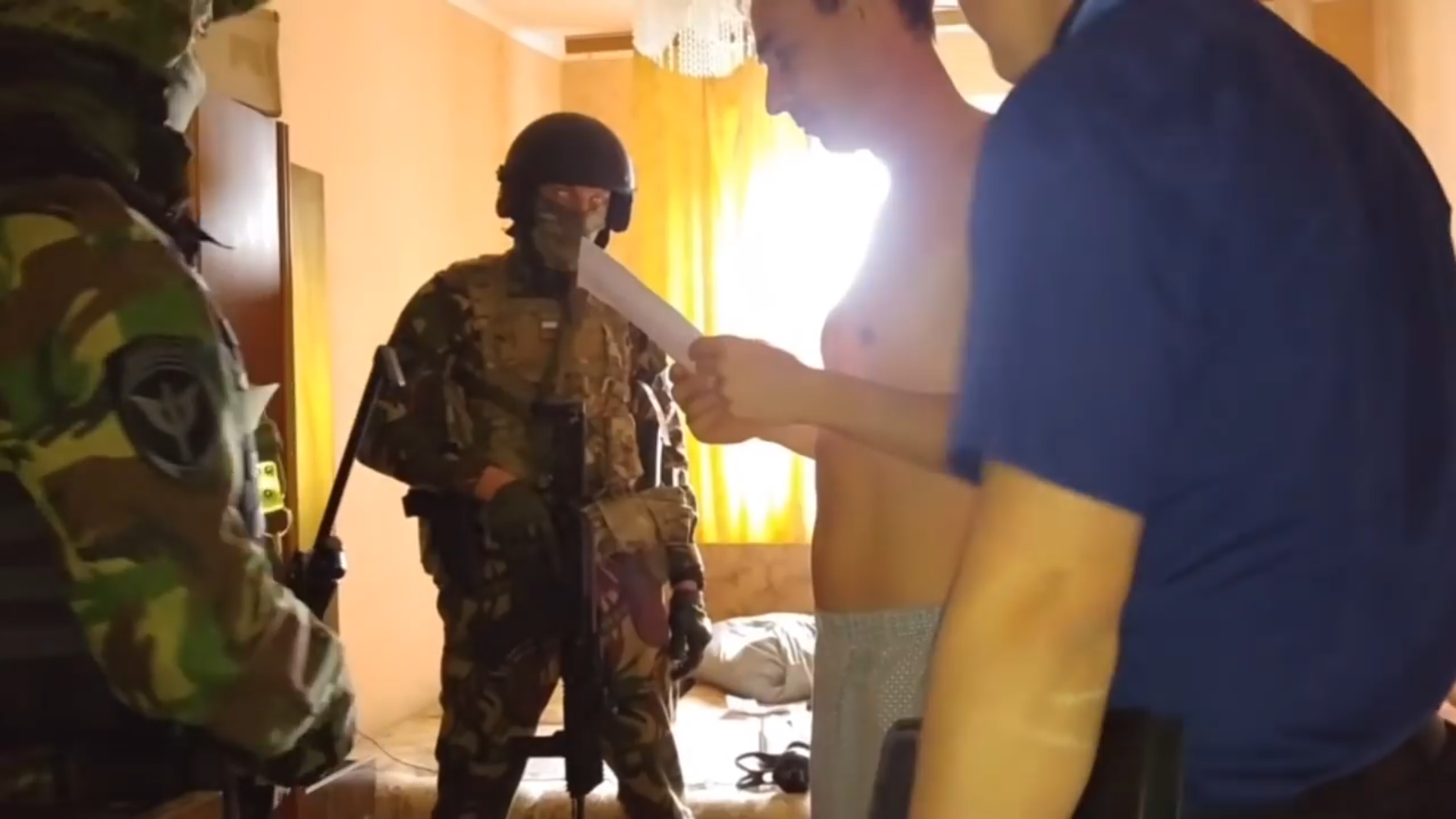
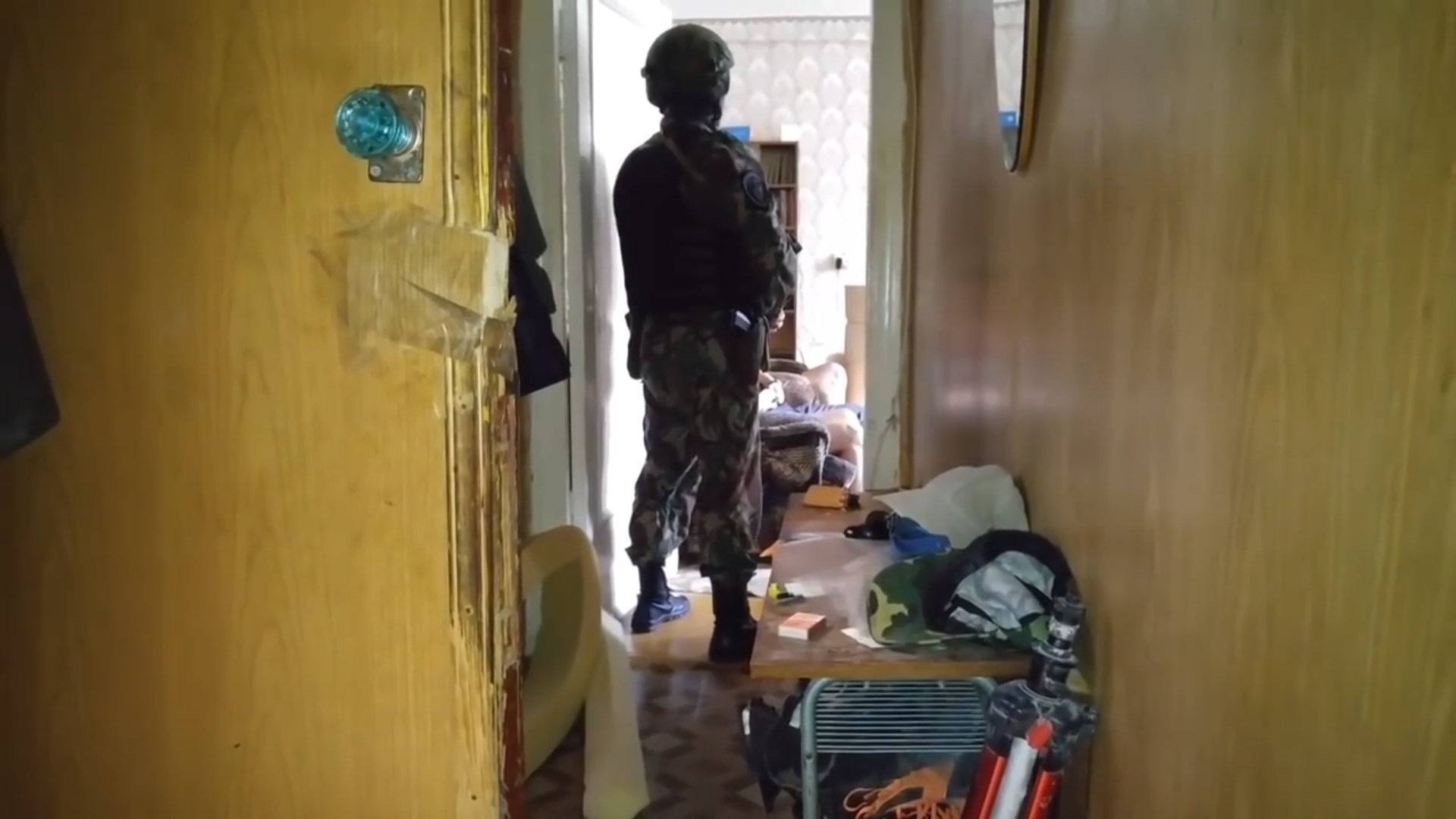
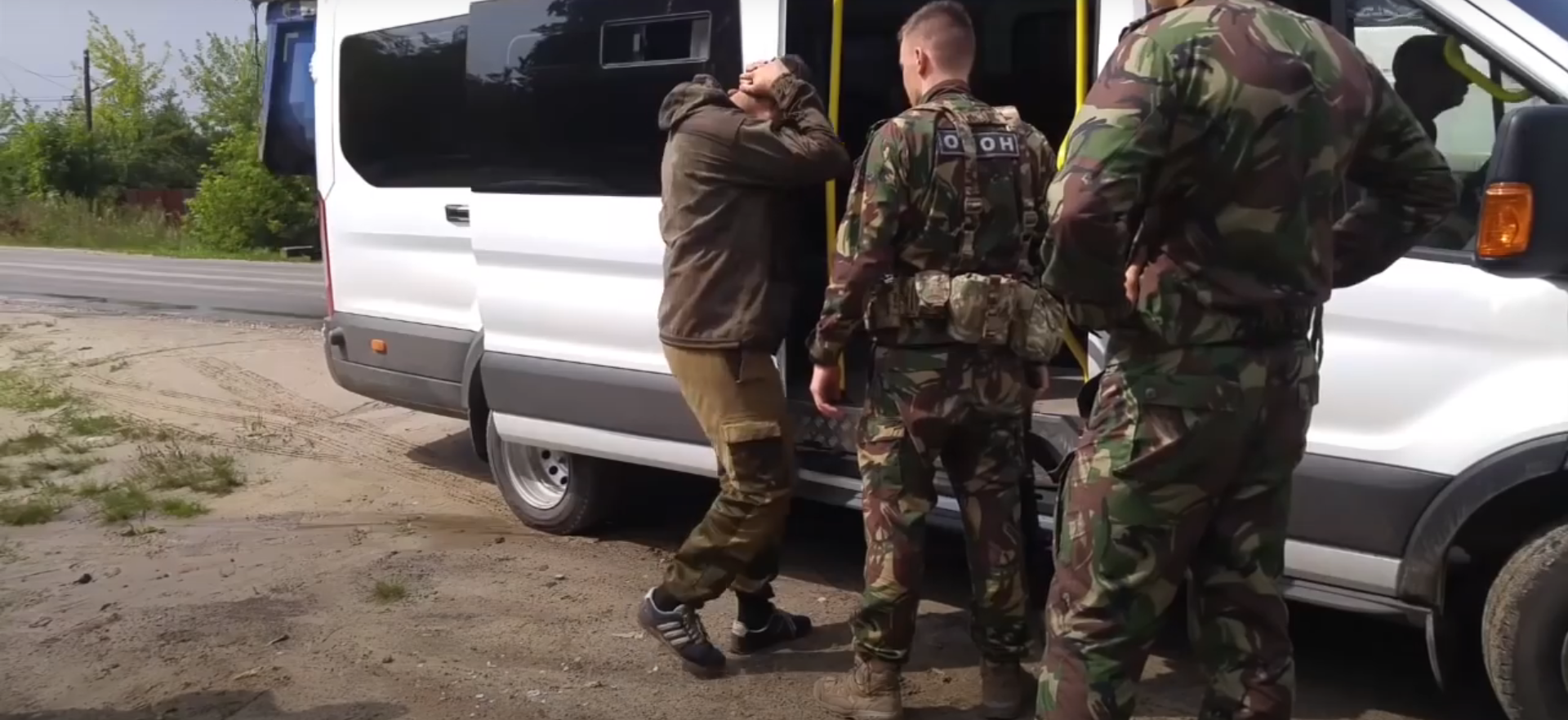
Trial by Media
While searches were being carried out in the apartments and the detainees were being transported to the police station for questioning, some media outlets, without any evidence, had already branded the Meniailovs and the volunteers as extremists and terrorists, and labeled the movement “Partisan Truth of Partisans” as a paramilitary structure and a cult.
It should be noted that these “investigations” by the media and their hasty conclusions had no basis, as, over time, the Investigative Committee decided not to initiate a criminal case due to the absence of any elements of crimes as defined by Part 1 of Article 239 of the Criminal Code of the Russian Federation [Creation of a religious or public association whose activities involve violence against citizens] and Part 1 of Article 282.1 of the Criminal Code [Organization of an extremist community].
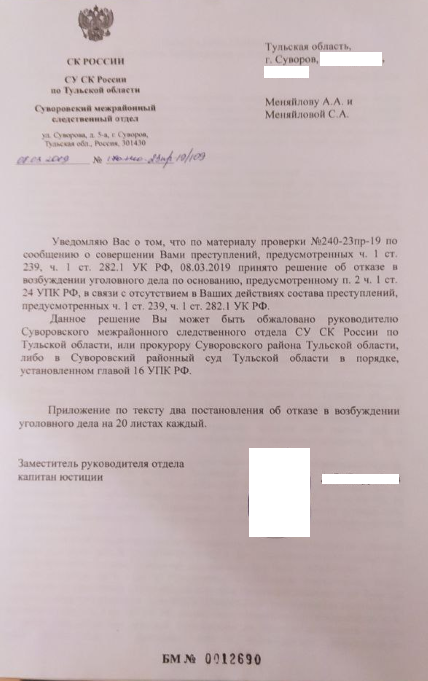
**Investigative Committee of the Russian Federation**
**Investigative Directorate for the Tula Region**
Suvorovsky Interdistrict Investigative Department
Address: Suvorov, Tula Region, Russia,
Tula Region, City of Suvorov
To: Meniailov A.A. and Meniailova S.A. Dear [Recipients],
We inform you that, regarding the investigation file No. 240-23pr-19 about the alleged crime under Articles 239, 1 (1), and 282.1 of the Criminal Code of the Russian Federation, on March 8, 2019, a decision was made to refuse to initiate a criminal case. The reason is the absence of evidence of a crime under Articles 239, 1 (1), and 282.1 of the Criminal Code of the Russian Federation.
This decision can be appealed to the head of the Suvorovsky Interdistrict Investigative Department of the Investigative Directorate for the Tula Region, to the prosecutor of the Suvorovsky District of the Tula Region, or to the Suvorovsky District Court of the Tula Region, in accordance with the procedure established by Chapter 16 of the Criminal Procedure Code of the Russian Federation.
Attached are two rulings on the refusal to initiate a criminal case, each consisting of 20 pages.
Deputy Head of the Department Captain of Justice
The media, which in some cases literally shout about the presumption of innocence of a particular person or group of people, strangely took on the role of judges in this instance.
“Every accused person is considered innocent until their guilt is proven in the manner prescribed by federal law and established by a legally binding court judgment.”
Article 49 of the Constitution of the Russian Federation
At the police station, all the detained volunteers were informed that they were witnesses and released.
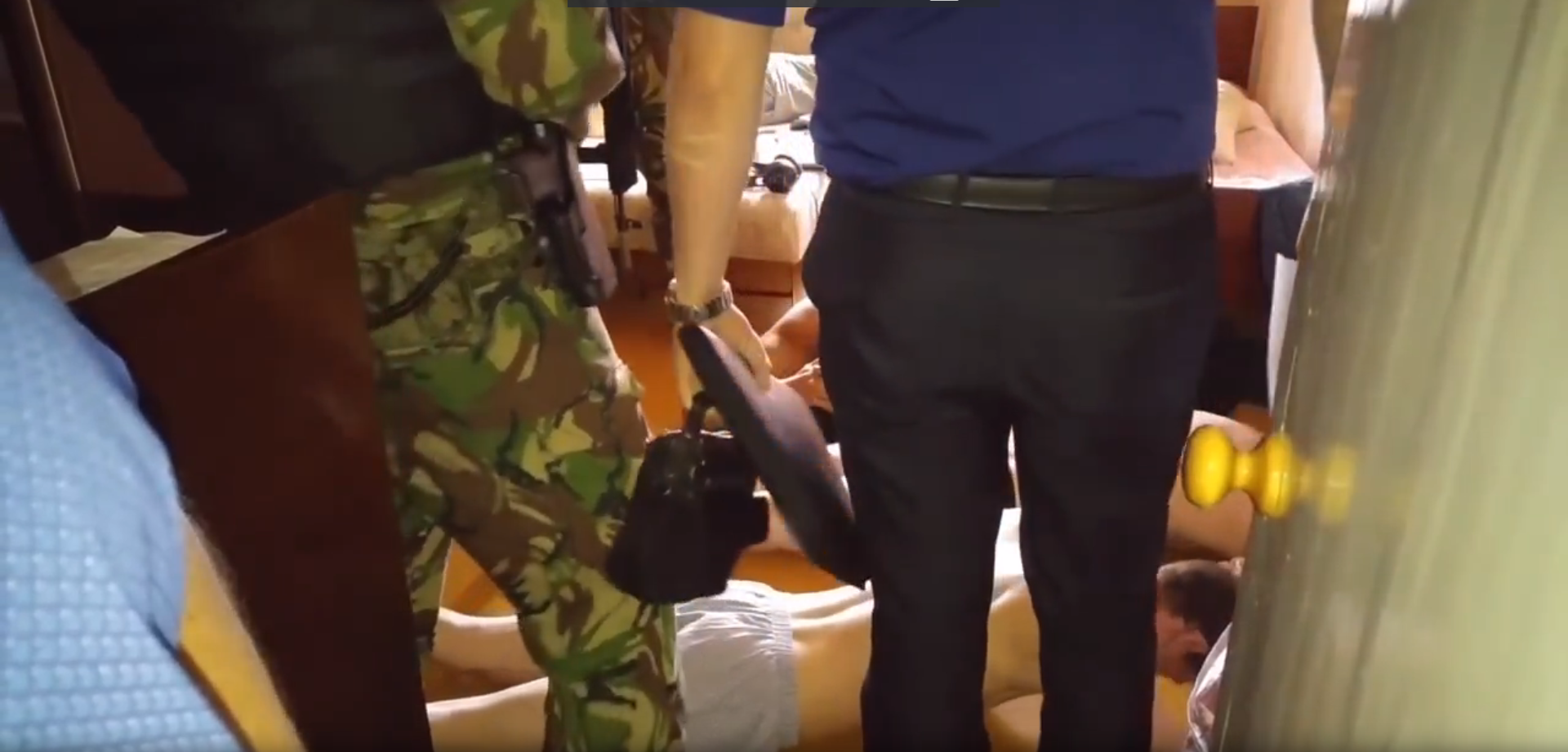
Aleksei and Slatana Meniailov remain detained. Later, they will be charged under Part 1 of Article 282 of the Criminal Code of the Russian Federation (Incitement of hatred or enmity, as well as humiliation of human dignity).
The trial of “Partizanskaya Pravda Partizan”
Aleksei Meniailov and Slatana Meniailova have been accused only under Part 1 of Article 282 “incitement of hatred or enmity, as well as humiliation of human dignity towards individuals or groups based on gender ‘female’, as well as affiliation with the social group ‘prisoners of war soldiers’.”
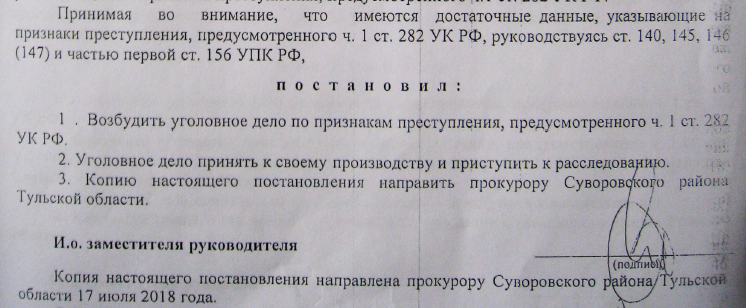
**DECIDED:**
1. To initiate a criminal case based on the signs of a crime under Part 1 of Article 282 of the Criminal Code of the Russian Federation.
2. To take the case under personal jurisdiction and begin the investigation.
3. To send a copy of this decision to the prosecutor of the Suvorovsky District, Tula Region.
Acting Deputy Head
A copy of this resolution was sent to the prosecutor of the Suvorovsky District, Tula Region, on July 17, 2018.
It should be noted that the court’s formulation raised many questions among lawyers and experts, as it implies the incitement of hatred and humiliation of all women without exception (from infants to the elderly) and all prisoners of war without exception.
For a guilty verdict under Article 282, an absolute action is required, meaning the accused must, through their actions, incite hatred and/or humiliate the dignity of all women and all prisoners of war without exception, which does not correspond to the reality of Aleksei Meniailov and Slatana’s activities.
In the open materials of Aleksei Meniailov, there are hundreds of mentions and examples of heroic actions and high moral principles of girls and women, whom the author admires. The same is true for prisoners of war: hundreds of mentions and examples of captured soldiers, whom the writer speaks of with approval and respect.
To contrast these women and prisoners of war, Aleksei Meniailov only provides examples of women with low social responsibility (Sex workers) and prisoners of war like General Vlasov (Soviet General who collaborated with Nazi Germany).
But the strangest moment in the trial is the accusation of Slatana Meniailova for… misogyny: a woman incites hatred and humiliates other women, including herself!
Later, while in detention, Slatana will be put under surveillance on suspicion of propagating misogyny in the women’s cell!
Slatana Meniailova in prison for humiliating herself?
Slatana Alexeyevna Meniailova graduated from school with a gold medal and university with a red diploma (With honors). Before meeting Aleksei Meniailov, she worked as a journalist. Initially, she became interested in the writer’s books and then offered her assistance in working on new studies, thus becoming his main assistant and later, after several major collaborative discoveries, his life partner.
One can judge Slatana Meniailova’s attitude towards the writer’s work by her unspoken speech in court:
Earlier, before prison, when I was asked the question, “What are Meniailov’s videos about in general?” I could not answer briefly. In prison, one’s perspective changes. You forget about the small things and start to see what really matters. Now, I can explain the essence of Meniailov’s videos in about five or ten minutes.
To begin with, let me remind you what the term “evolution” means. Evolution is peaceful development. I believe there is no one in this room who would claim that humanity has reached perfection and no longer has anything to strive for. Let me explain with a simple example what I mean by “human evolution.” The famous surgeon Fyodor Uglov is remembered in history for introducing many complex surgeries, including heart surgeries, that no one had successfully performed before. Before Uglov, many attempted such surgeries, but patients died. Professor Uglov did not hide how he succeeded. Before every new surgery, Uglov studied all available reports on surgeries performed on the organ he was currently interested in and looked for common details in successful surgeries and in those that ended in death. He correctly assessed the pros and cons. This is described in his memoirs. Using this method, Uglov saved the lives of many patients who were previously considered inoperable and sent home… to die. But Uglov gave them life and health.
Our story, for which we are all gathered here today, can be summed up just as simply. Writer Aleksei Aleksandrovich Meniailov wanted to make his wife happier. To do so, he set out to study the flaws and vices of women that prevent them from living happily.
It quickly became clear that the unhappiest women are those with low social responsibility(Sex workers). This is easily verifiable by referring to statistics. Among women with low social responsibility, the highest percentage of suicide attempts occurs. They are not trying to escape from happy lives into oblivion, are they? This is primarily who we studied, looking at the world’s literary and cinematic masterpieces. Then Meniailov identified the happiest women. They turned out to be the women Heroes of all times and peoples. Meniailov analyzed the common details of the heroines’ biographies and talked about them. I can say with full confidence that by studying the flaws of women with low social responsibility(Sex workers) and the virtues of heroines like Zoya Kosmodemyanskaya or Jeanne d’Arc, I became happier. Even more, from being a depressed, nervous, and bored woman, I became cheerful, calm, and confident. And not just me! Many women can say the same. After all, we did not hide our research, and thousands of women and men appreciated its healing effect. Our research heals not only the soul but also the body. I will give just one example: many women told me that Meniailov’s videos cured them of cystitis. Of course, not by just watching, but by women reflecting on their flaws and eliminating them. Of course, Meniailov did all of this not for me. After all, he began his research long before we met. And long before I was born. It’s much deeper.
You all know the writer Mark Twain, the author of “Tom Sawyer” and “Huckleberry Finn.” But few know that Mark Twain did the same thing as Meniailov. Twain analyzed people’s flaws and tried to understand the root causes of these flaws. He also studied the worldview of Heroes, especially Jeanne d’Arc. Placing the poles — plus and minus in their places — is the life purpose of true writers. Those who entertain the idle crowd are not writers; they are called something else. Mark Twain, like Meniailov, knew well that such service to the people, such research, gets one thrown in prison in all times and all nations. Therefore, he published his book on Jeanne d’Arc under a false name. Only after being certain that no one would be jailed for it did he confess to co-authoring it. And books analyzing human vices were never published during Twain’s lifetime. They were published only after his death. And his most important book — the quintessence of his worldview — the autobiography, Twain left instructions to be published only 25 years after his death. Mark Twain was a Great Writer. And Aleksei Aleksandrovich Meniailov is not only a Great Writer but also not a coward. The absence of feedback from readers reduces the depth of research. Mark Twain feared prison, but Meniailov did not. And that is why Meniailov’s research is deeper and more valuable. This will be acknowledged by scholars over time…
Is Meniailov an extremist, madman, or a scholar?
Above, it was discussed that Aleksei Meniailov is not an extremist. To debunk another myth about his mental health, let’s present the results of the psychological and the forensic psychiatric assessments conducted at The Serbsky State Scientific Center for Social and Forensic Psychiatry of the Ministry of Health of Russia, which took place during Aleksei Meniailov`s detention in the Tula city detention center.
The following questions were posed for expert resolution:

1. Did Meniailov A.A. suffer from a mental disorder at the time of committing the acts imputed to him, which rendered him incapable of understanding the actual nature and societal danger of his actions or controlling them (Part 1, Article 21 of the Criminal Code of the Russian Federation)?
2. Did Meniailov A.A. suffer from a mental disorder at the time of committing the acts imputed to him, which rendered him partially incapable of understanding the actual nature and societal danger of his actions or controlling them (Part 1, Article 22 of the Criminal Code of the Russian Federation)?
3. Does Meniailov A.A. suffer from a mental disorder that makes him currently incapable of understanding the nature and significance of the investigative actions being conducted in the criminal case and his procedural status, and performing independent actions aimed at implementing procedural rights?
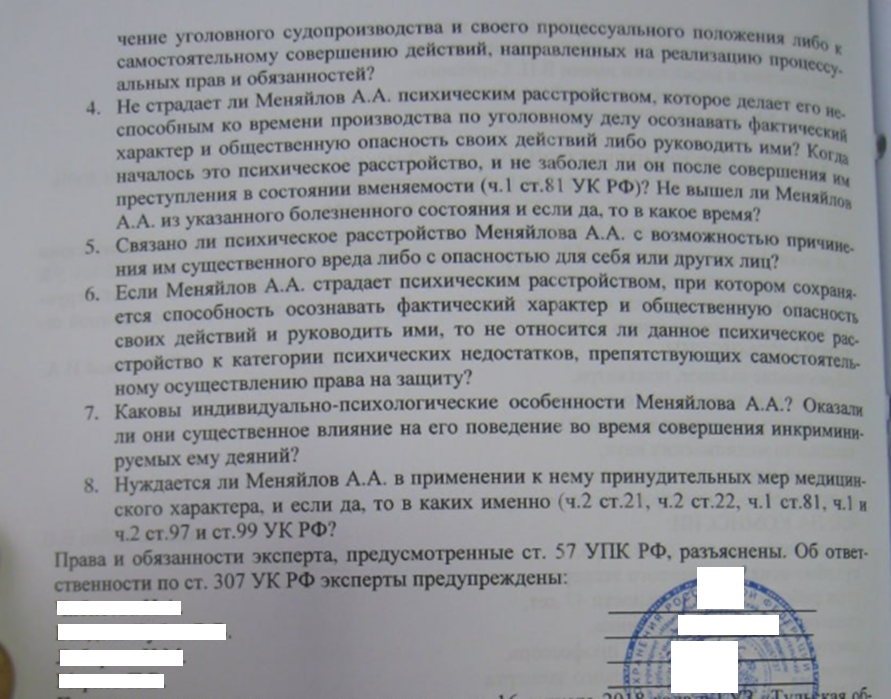
4. Does Meniailov A.A. suffer from a mental disorder that makes him unable, at the time of the criminal proceedings, to understand the actual nature and societal danger of his actions or to control them? When did this mental disorder begin, and did he fall ill after committing the crime in a state of sanity (part 1, article 81 of the Criminal Code of the Russian Federation)? Did Meniailov A.A. recover from this condition, and if so, when?
5. Is Meniailov A.A.’s mental disorder associated with the possibility of causing him significant harm or danger to himself or others?
6. If Meniailov A.A. suffers from a mental disorder while retaining the ability to recognize the actual nature and societal danger of his actions and to control them, does this mental disorder not belong to the category of mental deficiencies that prevent him from independently exercising his right to defense?
7. What are the individual psychological characteristics of Meniailov A.A.? Did they have a significant impact on his behavior at the time of committing the incriminating actions?
8. Does Meniailov A.A. require the application of compulsory medical measures, and if so, under which articles (part 2 of article 21, part 2 of article 22, part 1 of article 81, part 1 and part 2 of article 97 of the Criminal Code of the Russian Federation)?
Rights and obligations of an expert are provided in article 57 of the Criminal Procedural Code of the Russian Federation, clarified. Regarding responsibility under article 307 of the Criminal Code of the Russian Federation, experts were warned.
Fragment of the forensic psychological-psychiatric expert evaluation:
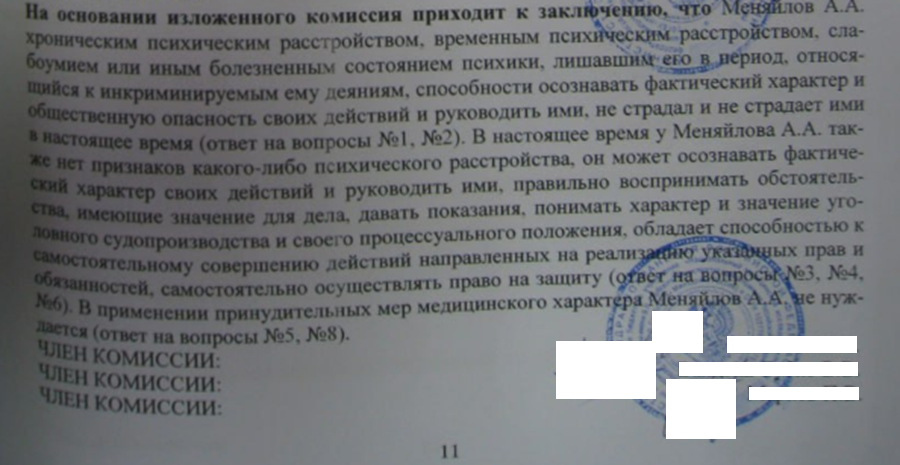
Based on the presented information, the commission concludes that Meniailov A.A. does not suffer from a chronic mental disorder, a temporary mental disorder, a weak-minded condition, or any other painful state of the psyche. During the period related to the incriminating actions, he did not and does not suffer from any mental disorders that could deprive him of the ability to understand the factual nature and societal danger of his actions or to control them (response to questions No. 1, No. 2).
Currently, Meniailov A.A. does not show signs of any mental disorders; he can understand the factual nature of his actions and control them, correctly perceive the circumstances of the case, understand the nature and significance of criminal proceedings, give testimony, understand his procedural position, independently exercise actions aimed at realizing his rights and obligations, and independently exercise the right to defense (response to questions No. 3, No. 4, No. 6). The application of medical measures of a coercive nature for Meniailov A.A. is not required (response to questions No. 5, No. 8).
Members of the Commission: [Signatures of members, names as follows:]
[Stamp of the commission or institution.]
Response to the psychologist’s question:
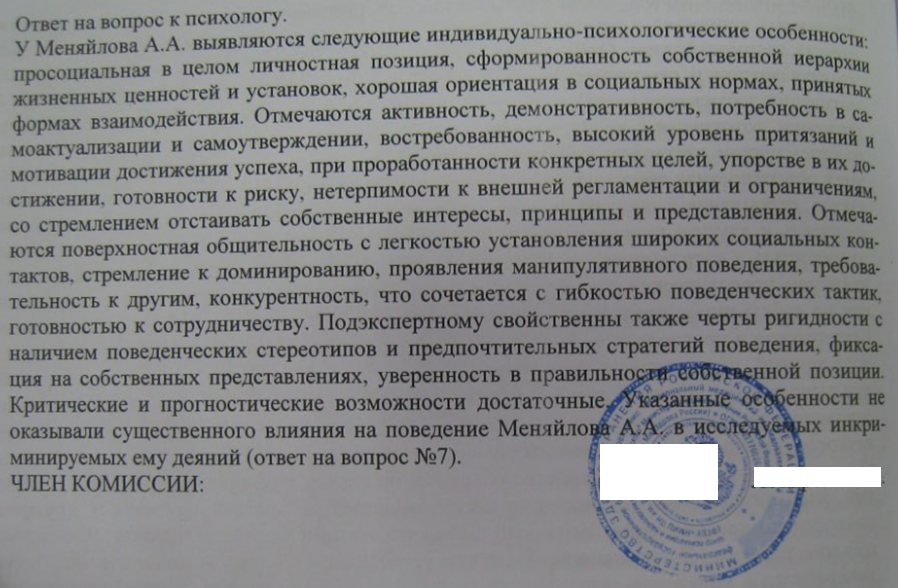
Meniailov A.A. demonstrates the following individual psychological characteristics:
A generally prosocial personal position, the formation of hisown hierarchy of life values and attitudes, good orientation in social norms, and acceptance of forms of interaction. Notable are activity, demonstrativeness, a need for self-actualization and self-affirmation, demand for recognition, a high level of aspirations and motivation to achieve success, persistence in working through specific goals, readiness to take risks, intolerance of external regulations and restrictions, combined with a tendency to defend personal interests, principles, and beliefs.
There is a tendency toward superficial sociability, with ease in establishing broad social contacts, a desire for dominance, manifestations of controlling behavior, demandingness toward others, and competitiveness, which is combined with flexibility in behavioral tactics and readiness for cooperation. The subject also demonstrates traits of rigidity, with behavioral stereotypes and preferred behavioral strategies, fixation on personal beliefs, and confidence in the correctness of their own position.
Critical and prognostic abilities are sufficient. These characteristics did not significantly influence Meniailov A.A.’s behavior in the incriminated actions being investigated (response to question No. 7).
MEMBER OF THE COMMISSION:
[Stamp of the commission or institution.]
The story of Meniailov at The Serbsky State Scientific Center for Social and Forensic Psychiatry is marked by a remarkable episode: after his examinations, the center’s staff asked Aleksei Meniailov to host a creative evening — a meeting with the author. At this event, held in the center’s assembly hall, about 200 doctors were present. They gifted Aleksei Meniailov a collection of works by Arkady Gaidar, a renowned Soviet writer and a founder of the Timur Movement. A symbolic gift.
Despite his unusual and sometimes sharp terms and concepts, Aleksei Meniailov can be rightfully called an innovative scholar. The history of science demonstrates that modern groundbreaking research in the humanities is impossible without an interdisciplinary approach. Meniailov, working at the intersection of history and sociology, psychology and ethology, literary studies and film studies, religious studies and paleontology, confirms this with his unexpected discoveries about Stalin and Shakespeare, Hercules and Mithras, bears and vultures, agates and ammonites. For adherents of a classical, disciplinary approach, such discoveries are simply out of reach.
The Department of Geochemistry and the Department of Oil and Gas Sedimentology and Marine Geology at the Faculty of Geology of Moscow State University have officially recognized A. A. Meniailov as a natural scientist who has created a new scientific school.
Recommendation Letter
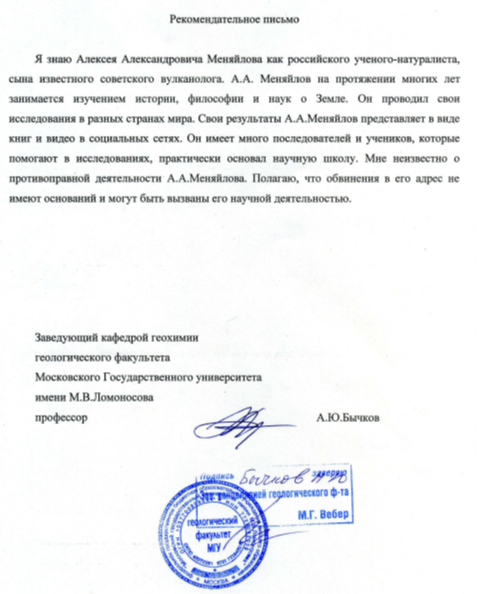
I know Aleksei Aleksandrovich Meniailov as a Russian scientist-naturalist, the son of a renowned Soviet volcanologist. A.A. Meniailov has been studying history, philosophy, and Earth sciences for many years. He conducted his research in various countries around the world. A.A. Meniailov presents his findings in books and videos on social networks. He has many followers and students who help in research and lay the foundation for a scientific school.
I am unaware of any contradictions in A.A. Meniailov’s scientific activities. I believe that the accusations against him are unfounded and could be caused by envy of his scientific achievements.
Head of the Department of Geochemistry
Faculty of Geology
Moscow State University named after M.V. Lomonosov
Professor
(Signature) A.U. Bichkov
(Stamp of the Faculty of Geology, Moscow State University)
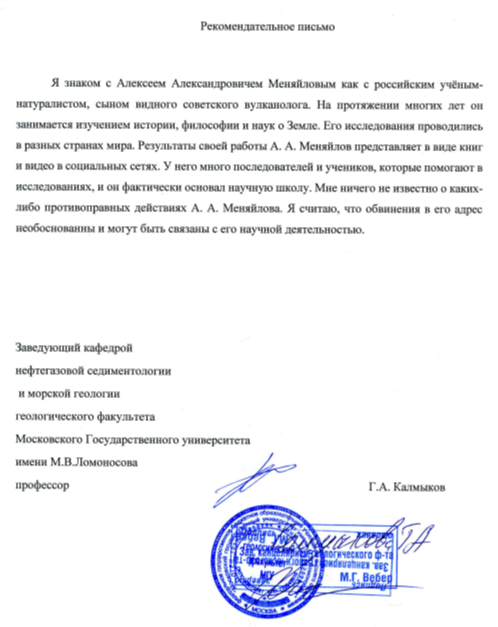
I know Aleksei Alexandrovich Meniailov as a Russian scientist-naturalist, the son of a renowned Soviet volcanologist. Over many years, he has been engaged in studying the history, philosophy, and sciences of the Earth. His research has been conducted in various countries worldwide. A.A. Meniailov presents the results of his work in books and videos on social networks. He has many followers and students who contribute to research and the formation of an actual scientific school.
I am not aware of any contradictions or conflicting actions by A.A. Meniailov. I believe that the accusations against him are unfounded and may be related to his scientific activities.
Head of the Department of Petroleum Sedimentology
and Marine Geology
Faculty of Geology
Moscow State University named after M.V. Lomonosov
Professor
(Signature) G.A. Kalmykov
(Stamp of the Faculty of Geology, Moscow State University)
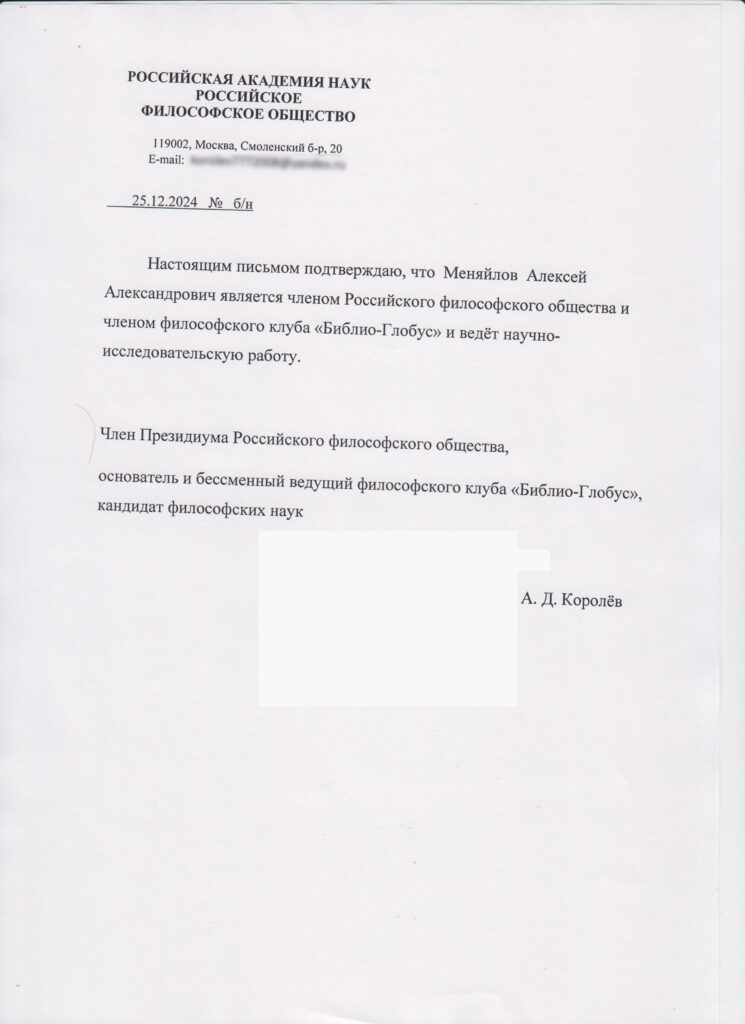
Russian Academy of Sciences
Russian Philosophical Society
119002, Moscow, Slozhensky Blvd., 20
25.11.2024 № б/н
This letter confirms that Aleksei Alexandrovich Meniailov is a member of the Russian Philosophical Society and a member of the philosophical club “Biblio-Globus” and conducts scientific research work.
Member of the Presidium of the Russian Philosophical Society,
Founder and permanent leader of the philosophical club “Biblio-Globus”,
Candidate of Philosophical Sciences
(Signature) A. D. Korolev
How Did Aleksei and Slatana Meniailov Get Out of Prison?
Let us recall that writer and philosopher Aleksei Meniailov and his wife, Slatana, were accused of a crime under Part 1 of Article 282 of the Criminal Code of the Russian Federation (incitement of hatred or enmity, as well as humiliation of human dignity). While the Meniailovs were held in a pre-trial detention center in Tula, public outcry arose due to numerous arrests of individuals charged with crimes under the same article.
Many citizens were arrested for liking and reposting public posts on social media, which, in the opinion of investigators and experts, contained “extremist” ideas in the form of texts, images, and videos.
As a result, in late December 2018, on the initiative of President Vladimir Putin, Article 282 of the Criminal Code was decriminalized. This meant that crimes under this article were no longer considered a threat to state and public order, and therefore, there was no need to deprive citizens of their freedom by placing them in custody.
Courts began urgently overturning decisions to detain citizens in pre-trial detention centers and closing criminal cases under Article 282 of the Criminal Code.
On January 11, 2019, the court canceled the measure of detention for Aleksei and Slatana Meniailov, and they were released after spending six months in the “Tula Central” prison (from July 19, 2018, to January 11, 2019).
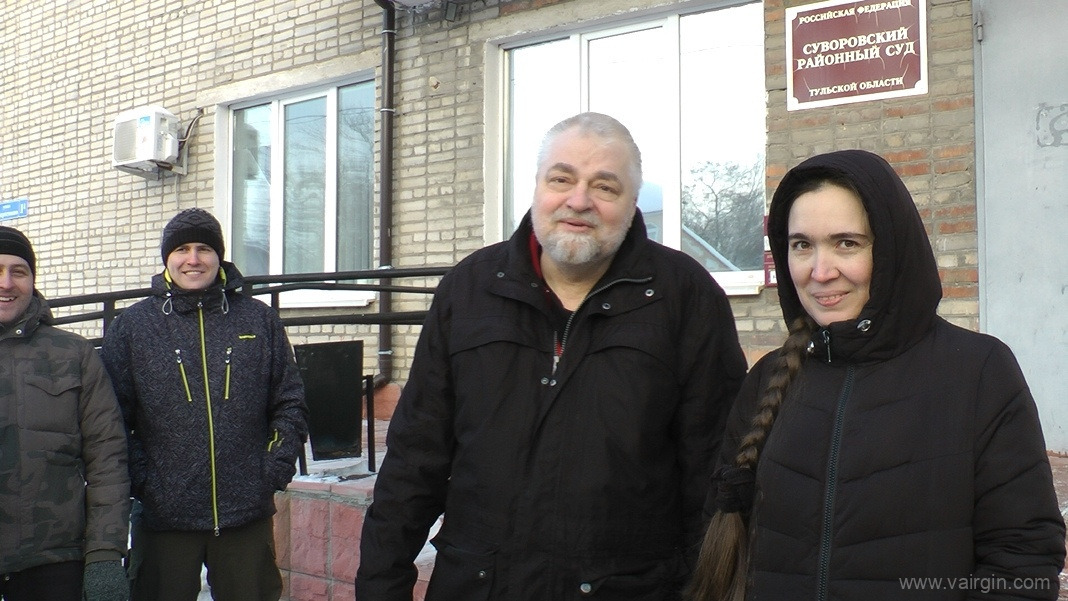
Where Is the Former “Partisan Truth of Partisans” Now?
Since 2020, the “Paleontological Truth of Paleontologists and Shakespeare” has been traveling around the world. For Aleksei Meniailov, as he himself says, this is something akin to political exile.
2020
Georgia. Cities: Gori, Batumi.
Tourist Itinerary:
- Exploring the childhood of Joseph Stalin in the city of Gori.
- Visiting the State Museum of Stalin.
- Visiting the Gori State Drama Theater named after Giorgi Eristavi.
- Visiting the Stalin Museum in the city of Batumi.
- Visiting the Batumi Seaport.
- Visiting the ancient cave city of Uplistsikhe.



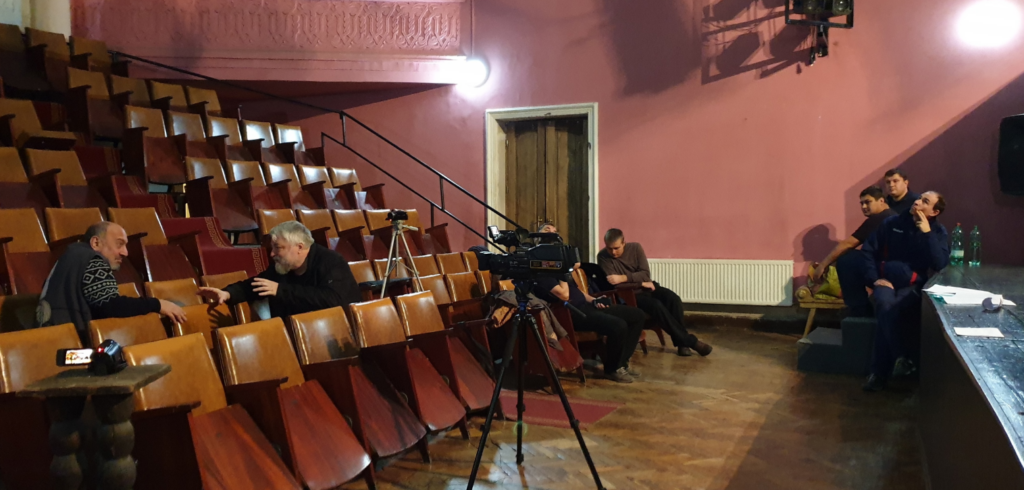
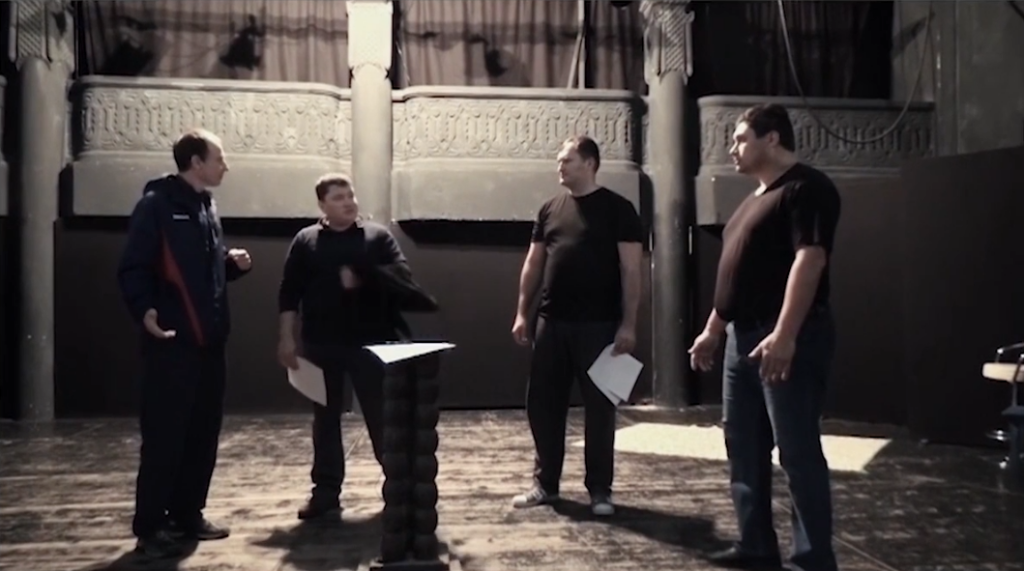


2021-2023
Turkey. Cities: Sinop, Sagalassos, Antalya, Konya, Şanlıurfa, Trabzon, Giresun, Samsun, Ünye, Ordu.
Tourist Itinerary:
- Visiting the city of Sinop, the birthplace of the ancient Greek philosopher Diogenes of Sinope and the writer Homer.
- Visiting ancient Roman amphitheaters, circuses, and acropolises.
- Visiting ancient Mithraeums.
- Visiting the Heroon and Nymphaeum in Sagalassos.
- Visiting the ruins of the ancient city of Sillyon.
- Visiting the ruins of the ancient city of Perge.
- Visiting the ruins of the ancient city of Midas.
- Visiting the excavation site of the ancient temple complex Göbekli Tepe.
- Visiting the ancient city of Pessinus.
- Visiting the ancient city of Aspendos.
- Exploring the sights of the city of Konya.
- Visiting the ancient city of Harran.
- Visiting the surroundings and museums of the cities of Samsun and Trabzon, considered the homeland of the ancient Greek tribe of Amazons.
- Visiting the ancient temple complex of Soğmatar.
- Following the “Agatha Christie” route from the city of Beyşehir to the city of Şanlıurfa, passing through the Cilician Gates mountain pass (via Pozantı railway station).
- Visiting the Kurul Castle in the city of Ordu.
- Visiting Mount Nemrut (Nemrut Dağ) and its attractions.
- Visiting the Temple of Apollo near the city of Didyma.



























2023-2024
Morocco. Cities: Casablanca, Safi, Al Bedouza, Oualidia, Marrakesh, Ouarzazate.
Tourist travel program:
- Study of the folklore and history of Morocco.
- Visit to the surroundings of Mount Toubkal.
- Visit to the waterfront of the city of Safi.
- Visit to the fortress in the city of Safi.








Tunisia. Cities: Tunis, Tozeur, Kerkennah Archipelago, Sufetula (Sbeitla), Degache, Carthage.
Tourist travel program:
- Visit to the Kerkennah Archipelago.
- Visit to ancient Roman amphitheaters, circuses, and acropolises.
- Visit to the museum in Hammamet.
- Visit to the Punic port of Carthage.
- Visit to the ancient Roman circus in Carthage, Tunis.
- Visit to the reconstruction of the ancient amphitheater in Carthage.
- Visit to the Baths of Antonius in Carthage.
- Visit to the National Museum of Bardo.
- Visit to the museum in the city of Sufetula.
- Visit to the temple complex of Hera, Zeus, and Athena in Sufetula.
- Visit to the zoo in the city of Tozeur.
- Visit to the filming locations of the movies “Black Gold” and “Star Wars” in the Sahara Desert.
- Trip to the Sahara Desert.
- Visit to the reconstruction of the ancient tower from the time of Augustus in the oasis of Kritz near the city of Degache.
- Visit to the ancient aqueduct with cisterns near Tunis.
- Visit to the troglodyte caves.






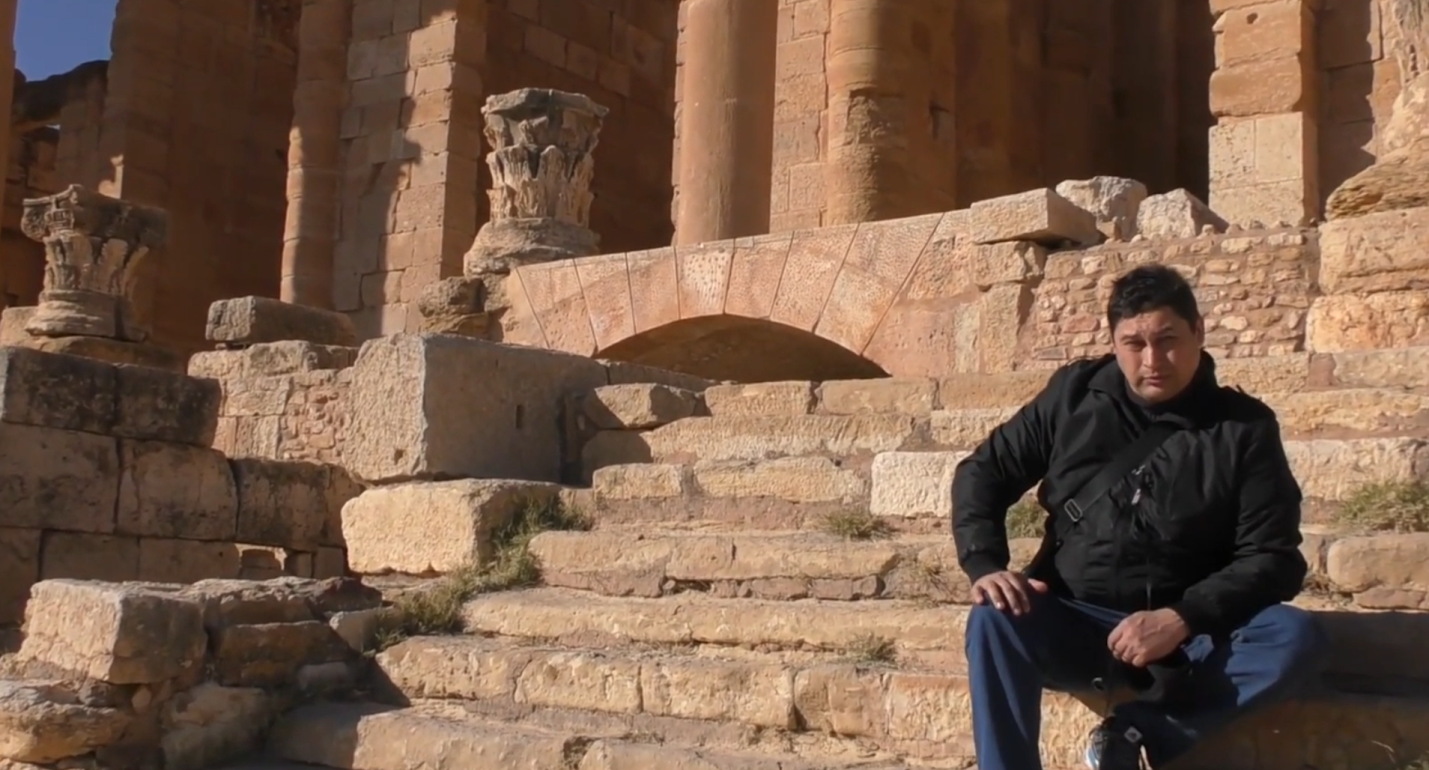







2024
Armenia. City: Yerevan.
Tourist travel program:
- Visit to the ancient monastery of Khor Virap.
- Visit to the ruins of the Zvartnots church.
- Visit to the settlement of Metsamor.
Turkey. Cities: Didim, Izmir.
Tourist travel program:
- Surroundings of Izmir, visit to the Temple of Apollo at Claros.
- City of Didim, visit to the Temple of Apollo.
- Surroundings of Izmir, visit to the Temple of Artemis in Sardis.





The Temple of Dionysus and a theater resembling a circus in the ancient city of Side, Turkey (Aleksei Meniailov)
Read the book by Alexei Meniailov
To be continued…

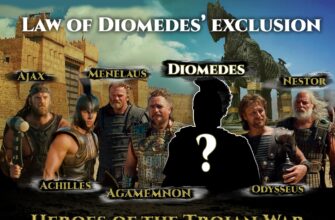
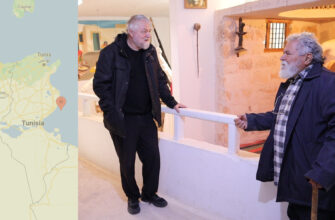
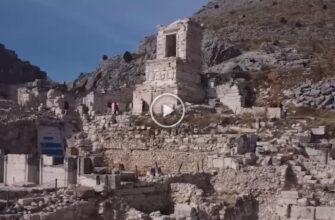
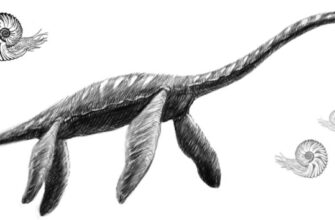

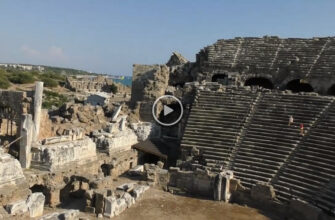


The Fusion of Science and Resistance
Meniailov’s interdisciplinary work is revolutionary. His research transforms how we view the past, drawing connections between survival tactics of partisans and the evolutionary strategies of ancient life forms. He challenges the boundaries of traditional disciplines, demonstrating that history and science are two sides of the same coin.
By exploring themes of resilience, adaptation, and transformation, Meniailov’s work resonates with audiences seeking meaning in turbulent times.
I ardently support the author. His works expand on what is required for the common good of all human kind.